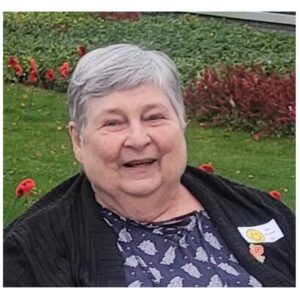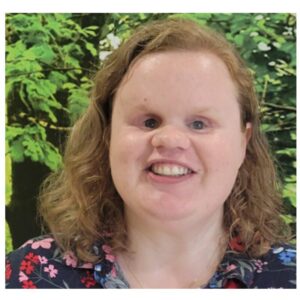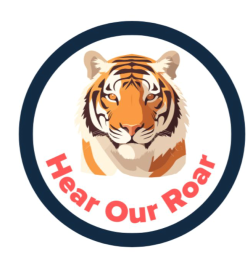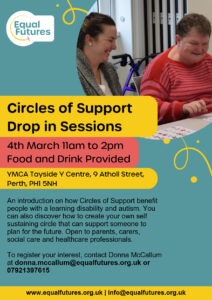In Conversation with Irene & Dianne, reflections on the impact of Intersectional Stigma of Place-Based Ageing upon everyday life.
Introduction
On seventh March, Community Peer Researcher (CPR) Irene Johnston and ISPA Research Fellow Dr Dianne Theakstone, co-presented at an International Women’s Day celebration held by Gender Equality Perth. Both ladies have significant social anxiety, and in preparation for the event they wanted to support each other sharing their lived experiences of gender, ageing and disablement. In this ‘In Conversation With’, Irene and Dianne reflect upon their involvement in ISPA and how it has opened up new opportunities and possibilities.

Irene: It was a year ago when you spotted an advertisement for presenters to take part in a celebration within a supportive environment. Somehow, you persuaded me to co-present – there may have been lots of cake involved here! So, we put in a joint application to Gender Equality Perth who were holding the event.

Dianne: We didn’t make it last year, but I was determined that we should try again and this year our application was accepted. There was a new theme so it was a case of thinking what we could do and talk about. We decided on a slightly different approach to the presentation. We recorded interviews where we outlined our backgrounds and connections to gender, ageing and disability. Then, we used poetic transcription to turn our interviews into poems. We also talked a bit about our first encounter of each other.
Irene: I remember when we first met, it was just last year. I volunteered at the Perth and Kinross Centre for Inclusive Living (PKCIL). I’ve been involved PKCIL for a long, long time – first as a Personal Assistant for a young woman with learning disabilities and then, latterly, as a disabled person. Dianne’s among one of our newest members and she had sent an email around inviting people to join the ISPA project. I was a bit worried about meeting you, this doctor, and I wasn’t sure how we would get on. So, we arranged to meet over some lunch to discuss ISPA.
Dianne: I remember that day, we went to the Coffee Bothy and there was cake involved. We were there all afternoon and just talked and talked and we really hit it off. We share the same sense of humour and passion for inclusion.
Irene: Since then, you are always roping me into new things, and it’s been fantastic. The main activity I’ve been involved with are the reflective, themed diaries for ISPA, but you also got me involved in the Green Room at the Stirling Community Hospital. They were looking for input from disabled people about their outdoor space accessibility and things snowballed from there, fantastic meeting new people, and there is just such a sense of community. The group has planted flowers and veg in accessible planters, tried mindfulness in nature, arts and crafts and most importantly, learn from peers and we have our discussions in the brilliant café run by volunteers.
Dianne: So, what did you think about doing the presentation?
Irene: It’s really daunting speaking about yourself in front of a room full of strangers. So, I think swapping poems and reading about the other helped. We had quite a few rehearsals but, this didn’t prepare us for everything on the night!
Dianne: Oh, gosh I know. Picture a nervous looking wheelchair user closely followed by an equally nervous looking totally blind person and that was us, trying to track down food in Perth before the event.
Irene: After a few false starts, we grabbed sandwiches and arrived outside the A.K Bell Library door to have my wheelchair battery die. The spare was also flat. But the third and final chance thankfully worked to everybody’s relief!
Dianne: Panic averted we were good to go except once we got upstairs, I discovered that my brailed poem about you had fallen out my bag. With only half an hour to go, a hunting party was assembled to retrace our routes. Incredibly, the speech was found, rather bedraggled and sporting several tyre tracks.
Irene: At least after all the drama though, our presentation went really well, and we were made to feel beautifully relaxed and valued.
Dianne: So, we thought we would share the poems with you to enjoy:
IRENE
A 73 year old mother –
a boy and a girl,
grandmother of 6 –
Four boys and two girls,
Range in age from 16 to 32 .
My first child in my 16th year, child two at 21,
a marriage that lasted 7 years, divorced at 23.
Becoming a single parent, took its toll on me,
nobody wanted to employ you, being a single parent –
gender inequality – very hard in those days.
Really hard to get jobs,
had to take whatever I could get –
A shop, a factory, bar work, a taxi driver for many years.
wasn’t many jobs I hadn’t tried.
It was whatever I could do to get work.
Wasn’t until my 40’s when I got into social work,
worked with Perth and Kinross Council,
30 years of my life.
Worked with older people – adults with learning disabilities,
Loved working in both jobs, a happy time in my life.
Used to help people with benefits, help them fill out forms.
Your made to feel like you’re asking – for something that’s not yours.
Almost feels to them like they were begging,
It is your right, you’re entitled to these I would say,
So, the person would get their benefits – felt good for helping them.
Wanted to retire, near the water,
Got my wish today.
Lived there for about four years,
Absolutely love it –
such beautiful views.
Now a hectic social life,
Attend a mental health group.
Disabled rambling,
we go out on scooters, go all around,
then a stop for a picnic lunch
Thursday night, a ladies group,
been fantastic fun,
brings me out of my depression,
bingo in Kirkcaldy, a boat trip down the Forth, lovely meals together,
Good company and companionship.
My Friday group – won’t give that up,
others with disabilities from all over.
A fantastic group –
lovely meal out at Christmas time,
raffles, bingo and won loads of prizes.
The biggest sense of freedom though,
my favourite thing of all to do,
Passed my driving test when I was 21,
Absolutely adore driving and
the sense of freedom remains today.
A very independent person – it’s the way were brought up.
The main barrier to equality – I think it’s our generation,
People are just so proud and don’t want to ask,
because that’s what we were taught to do.
If you don’t ask now then the day will come – there will not be anything there for you.
Gone out and bought what I need,
or worked around it to get it done
A wooden tea chest upside down.
old squares of carpets – a psychedelic pattern.
So proud of myself I had done that, you know,
But look to education that prioritises life skills,
teach first aid, balance a budget and teach how to save up.
Learn to live, to start a home from scratch,
have patience, work for what you get.
Education and resourcefulness contribute to equality.
Make a stand when there’s things that feel unfair,
challenging them, these big authorities –
If I thought that somebody was being treated unfairly .
If you don’t know something is available, how can you even know?
It’s through sharing information and activating action.
I think it’s getting better,
women are getting treated better today.
Now that fathers are getting more rights – They’re able to help in lots of ways,
Support women through parental rights to both men and to women,
or through work and retirement – Fair and equal across the board.
If I try and think what advice I would give,
I would aways say to work to get what you want,
Check what you you’re entitled to – fight for everything that you can,
and if you feel strong enough and you’ve got a strong opinion,
then fight for it until you’re blue in the face – you’ve got a mouth in your head.
DIANNE
Describe myself as short and cuddly –
approaching 42.
Been blind since I was 5 years old,
A different sense of perception.
Have had 4 guide dogs –
very different personalities
A smart long cane gets me around today
Providing cookie recipes and hazard recognition.
Reading, Listening to Radio 4,
Walking, holidays and exploring.
Love café’s, I also love cake although probably too much.
Like to volunteer – a focus on disability or social care,
assisting others, the friendship an opportunity shared.
But then there’s the challenges –
Pavement parking, wheelie bins all around.
Close your eyes, imagine – A day walking with me.
Work on a project called ISPA –
a research fellow in co-production,
exploring ageing and disability,
and the importance of where people live.
Give a voice to marginalised groups,
in debates and consultations.
Try to contribute through my work,
to improve access and inclusion.
Disability has been with me most of my life,
solutions to everyday challenges –
need to think outside the box
the chance for trial and error.
Society isn’t fully inclusive,
There’s still lots of discrimination and inequality,
Its better than it was but…
We have a long, long, way to go.
Always been struck by research and statistics,
disabled women more likely to be impacted,
By say, unemployment,
or lack of job opportunities.
Sometimes quite hard when going for interviews.
sometimes it’s just a feeling –
a predetermined candidate profile,
We need to look more at representation of disabled women.
To bring down some of the barriers,
start an early age,
with stories that represent diversity,
not something to feel negative about.
Make children aware of difference,
learn to celebrate the diversity in the world.
We need more role models to look up to,
through education and making it part of our culture.
Try to embed equality as well,
social media gets the message out.
Brings people together again –
through projects and community
and peoples lived experience.
Look at culture and shaping policies
encourage organisational change
A focus on collective action needs to be addressed now
Everyday challenges build up now,
can break you down, you know,
sometimes harder to bounce back up.
Takes more effort to pester and persist
Looking back at my younger self,
had more confidence and more energy,
she had some strong advice for me –
Get on with it, get it sorted, try it and see.
Dianne: I’m glad we did the event together it was an enjoyable experience and a real confidence boost. I made lots of new contacts and I’m looking forward to staying in touch with for future activities. How about you Irene, how do you feel about being involved in things like ISPA, the Green Room and International Women’s Day?
Irene: Since meeting you I’ve been involved in so many things. It’s made things better for me because I don’t have to talk about negative things when I’m over in Stirling and I am happy to do that because it’s made a difference. When I found out that I was talking about things that overlapped with another presenter’s speech I felt really included and comfortable because what I had to say was relevant. My anxiety level immediately reduced, and you know I said I wouldn’t be answering any questions, but by the time the questions came I knew I could answer them.
Dianne: So what’s next Irene I know you’re a busy woman? Any goals or hopes for the future?
Irene: It depends on what you’re going to talk me into next!


